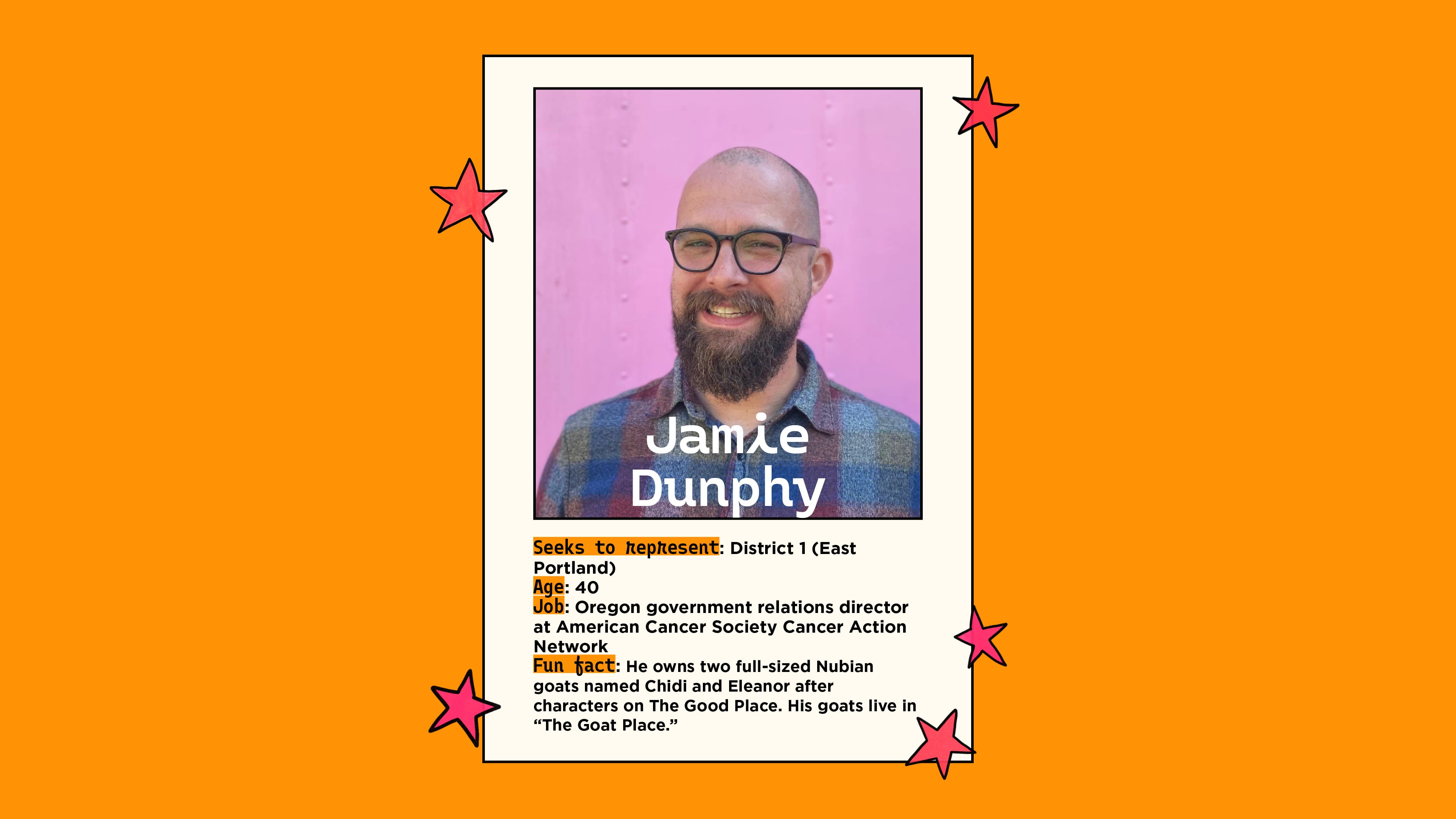Seeks to represent: District 1 (East Portland)
Age: 40
Job: Oregon government relations director at American Cancer Society Cancer Action Network
Fun fact: He owns two full-sized Nubian goats named Chidi and Eleanor after characters on The Good Place. His goats live in The Goat Place.
Jamie Dunphy is ready for a new City Council because he worked for the old one.
Dunphy was senior policy director for Commissioner Nick Fish, who served from 2008 until he died in 2020. He loved the player, but not the game.
“I spent a long time working in Portland City Hall under the old system, and I saw firsthand how deeply broken that system was,” Dunphy tells WW. “Regardless of what the new system looks like, it has to be better than the old one.”
Dunphy left City Hall when Fish did. He’s been busy since. His day job is Oregon government relations director at the American Cancer Society Cancer Action Network. He volunteers on the Parkrose School District budget committee and as a board member at MusicPortland, where he’s been fighting Live Nation’s plan to open a venue in Portland, the last big city that the company—charged with antitrust violations by the U.S. Justice Department—hasn’t conquered.
Dunphy blames government for not implementing the will of the people, as expressed in ballot measures like Measure 110, which decriminalized illegal drugs.
“With every good intention and absolute failure on implementation, I worry it’s a death spiral for our community and that people will simply give up on Portland,” Dunphy says.
East Portland suffers disproportionately, Dunphy says. A graduate of Grant High School, Portland Community College and Portland State University, Dunphy has lived in Portland for 26 years, the last eight of them in East Portland.
“My daughter does not have the option of walking on sidewalks the entire length of her journey to school,” Dunphy says. All this talk of downtown Portland dying? Dunphy thinks it’s small potatoes compared with East Portland’s problems.
Dunphy has received $40,000 in matching funds through the Small Donor Elections program. He’s been endorsed by mayoral candidate Carmen Rubio and the producer of Portlandia, David Cress. He’s also been endorsed by 15 labor unions, including Portland Fire Fighters Association, LiUNA 483 and 737, and the Northwest Oregon Labor Council.
WW spoke to Dunphy about his campaign. Questions and answers have been lightly edited for brevity and clarity.
WW: What are your top three priorities if elected?
Jamie Dunphy: My top priority is the basic livability of our city. It is deeply inhumane to watch what is allowed to happen on our streets, allowing our neighbors to sleep unhoused. We also have to invite people back to the public square to encourage good behavior and discourage bad behavior.
My second priority is supporting small businesses. The city can support these businesses using permit reform, community activation, and repairs to infrastructure and making our streets and sidewalks places that people want to visit.
My third priority is recognizing Portland as the independent music capital of the world and using it as a tool for economic development and community safety. I want to put music in public parks, plazas and business districts, and to recognize that there are no amount of cops that we could hire that will have the same effect on public safety as a concert getting out at 1 in the morning and people mulling about and going to bars and restaurants.
Beyond policing, what measures would you take to improve public safety in Portland neighborhoods?
Police are a highly specialized tool for scary situations, and I acknowledge there are situations in which the only appropriate response is a highly trained individual with a gun. I did gang prevention in a middle school for years. We do need armed, accountable professionals. We also need to expand Portland Street Response to 24/7 citywide and expand Portland’s park rangers program. We need noise enforcement officers. We need traffic officers to be doing traffic enforcement. We have historically viewed public safety and general community regulation as the sole responsibility of police. I think it’s wildly inappropriate for that to be the paradigm.
What aspects of the city’s current approach to drug use and overdose deaths do you support and what would you change?
All the conversations about a deflection and sobering center focus around downtown, but East Portland has historically had no services and yet we have extreme concentrations of poverty and homelessness.
Do you support the city staying in the Joint Office of Homeless Services? What’s your plan to address homelessness?
I support the city staying in the Joint Office, but I recognize that that relationship right now is toxic. We recognized early that there are certain things the county can do that the city cannot. But we each have our role within this. We need a common definition of success, and we need to never lose track of that and run full speed at it.
How do you feel about the new structure of city government and ranked-choice voting?
I’m cautiously optimistic that this new system will streamline how the city does basic business. Some wonderful folks are running, but not a lot with deep experience knowing exactly what the job is going to require. I believe that ranked-choice voting is going to help the cream rise to the top. It still feels like voters don’t know how to rank. It’s going to be messy, it’s going to be hard, and it’s not going to end the way we think on this first round.
Would you change the Portland Clean Energy Community Benefits Fund?
I would make sure that we enshrine it to be as true to its original intent as possible. I think that the PCEF dollars are an opportunity to reframe how we think about climate change. There are some serious limitations to what PCEF dollars can be used for and should be used for. And I think that the question should instead be, how do we reframe the city’s general fund and the broader budget to amplify the benefits of what this program could bring?
What are your priorities for improving Portland’s infrastructure?
A lot of conversation around City Council is about the plight of downtown, and I don’t care about downtown, it will be fine. We’re not going to suddenly have vacant spaces downtown the way that we have vacant lots in East Portland. We have an enormous need for intense development. The lack of representation shows when the city tries to make improvements to infrastructure, they do things like planting trees, and then they let the trees die because no one thought about how to water them. It leads people in East Portland to believe that the government can’t do hard things.
Which current City Council members do you and your policies most align with? Please specify just one.
Not to continue the progressives’ choosing Carmen Rubio dynamic, but Carmen Rubio is a fellow Nick Fish alumni. She is a friend, and I have been a big fan of hers on the City Council.
How do you want police to respond to the riots in November if Trump wins?
Trump is not going to win, but there’s still going to be a conversation about Portland being a protest city. We need to be intentional about working with businesses in places that we know will be most likely to have protest activity and not be caught flat-footed. We can do some built design, or build infrastructure, such as using fences around target points and blocking off streets.
How do you plan to win this election?
It’s going to be about educating voters one by one. East Portland is fundamentally different than any of the other districts. East of I-205, it is 25% registered Democrats, 25% registered Republicans, 46% non-affiliated voters and voters who were only registered to vote because they got their driver’s licenses. And when you look at the data, almost none of them voted, ever. It is going to mean that this is a fundamentally different kind of election, and so I am investing heavily in door-knocking.
See the other Portland City Council Candidates here!
 This article is part of Willamette Week’s Ballot Buddy, our special 2024 election coverage. Read more Ballot Buddy here.
This article is part of Willamette Week’s Ballot Buddy, our special 2024 election coverage. Read more Ballot Buddy here.

